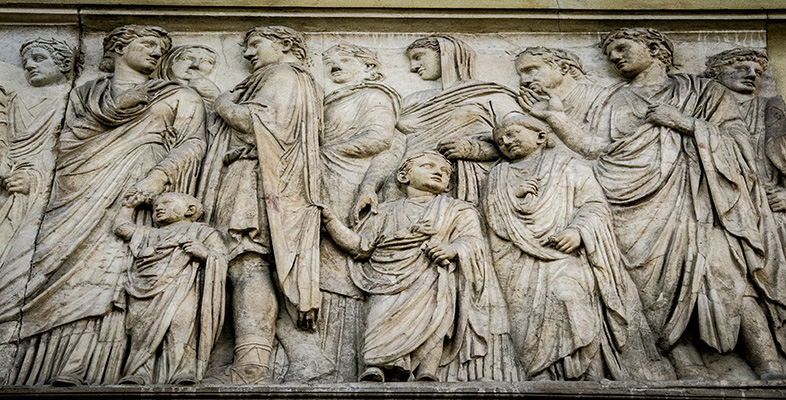2.1 An initial exploration
To begin your own exploration of the Classical world, you will first read the introduction to the book of essays, Experiencing the Classical World. It has been written not only to introduce the essays in the book, but also to introduce you to some of the fundamentals of Classical Studies.
Activity 2
Click to open Experiencing the Classical World [Tip: hold Ctrl and click a link to open it in a new tab. (Hide tip)] .
Below is a list of learning outcomes that illustrate what you might expect from a course on the Classical world. As you read, tick off the relevant learning outcome each time you meet a section of the course which addresses that outcome:
acquire a broad knowledge of the political, social and cultural history, as well as the geography, of the Classical world;
acquire a broad knowledge and understanding of the various disciplines that make up Classical Studies, and develop your ability to practise the methods of enquiry used by these disciplines;
develop your ability to examine critically different kinds of ancient material and modern interpretations of this material;
develop skills to communicate your knowledge and understanding in an appropriately scholarly manner.
Discussion
The aim of this activity was to make you think about what you were learning, as you were reading. Such reflection helps you to focus on topics as you learn and also to realise just what it is that you have learned. You should have been able to tick off each one without too much trouble.
Obviously, you haven't had much chance to develop a ‘broad knowledge and understanding’ quite yet, but you've made a start, and we hope that you came away from the introduction having learned and understood some new things about the Classical world. Similarly, you might not have had much chance to develop your powers of critical examination, but you were given some examples of looking at images of artefacts and ancient sources that provide you with an idea of what you should be learning as you progress with your studies in the area. Source analysis, as it is called in shorthand, is a fundamental skill in Classical Studies. The results of source analysis can then be organised into a discussion and argument to communicate your knowledge and understanding. This course doesn't actually give you the opportunity to do the communicating, but the case study within the text that you have just read did provide an example of an argument about the significance of the curia of Pompey, drawn from the analysis of a variety of sources. You might like to use the course forum to develop and communicate arguments drawn from source analysis, but this is not an expected outcome of this introductory course.
The introduction also emphasises how exploration of the Classical world can be an interdisciplinary study, and promises more in the following essays. However, there is no single interdisciplinary approach. The selection and combination of subdisciplines and how they may be used together varies, depending on the questions being asked and the material being studied. The introduction will have given you an impression of the enormous range of possibilities for studying the Classical world. No surprise then, that you can't do it all in one course. The course will not cover everything; it does not attempt to provide you with an overview of the whole Classical world. Instead, it provides you with interesting examples to equip you with the basic skills that you will require to undertake further studies on the Classical world.
